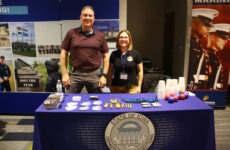
Photo by: Bailey Perkins
“Adam” logged on to Blackboard to finalize the accounting homework due that night and realized he had an exam due in 30 minutes. The exam was 60 multiple choice questions, and he had 30 minutes to complete it.
His plan of attack: Phone a friend. While he had the exam pulled up, his friend would type out questions into Google to see if he could find the answer. Adam, on the computer with the exam, would also copy and paste the questions into Google to see if he could find the answer.
It was a good plan to get the exam done in the time given, except it was cheating.
“It’s much easier to call a friend and have them help out. Especially when you forget about a test. And with online classes, I don’t have to worry about the teacher seeing me cheating,” Adam said.
Students are going for online classes recently rather than the traditional education because of more flexibility and less face-to-face social interaction.
While most classes do take more discipline and self-motivation, some students find shortcuts when it comes to writing papers and taking quizzes and exams in online classes.
Academic dishonesty at DMACC is defined with six characteristics: Plagiarism, falsification, unauthorized collaboration, substitution, cheating and failure to comply.
Plagiarism involves “using another person’s writing/academic work and submitting it as your own” and “failing to correctly cite another person’s writing/academic work.” In the journal article “Term Paper Mills, Anti-Plagiarism Tools, and Academic Integrity” linked on DMACC’s website, Donald McCabe said, “Less than half of the students surveyed felt that copying a few sentences without a citation was wrong.”
Another poll in the journal found “66 percent of students said that cheating ‘didn’t seem like a big deal.’”
A professor studying cheating in online classrooms at two liberal arts colleges said, about “40 percent [of students] reported doing so in online quizzes,” and “about 13 percent reported cheating on papers and the same percentage admitted to bending the rules in online discussion boards,” in an article in the U.S. News & World Report.
In English Professor Rose Toubes’s writing classes, she tells students, “Your writing is like a fingerprint,” and, “In just a few weeks, we get to know a student’s writing,” so it is obvious to her when a student plagiarizes.
Students are warned at the beginning of the term about the consequences that come with academic dishonesty.
Some professors specify their content so it is so unique that students wouldn’t be able to find anything about it online.
“The things I assign are so particular like reading and commenting on a story that there’s no real way to cheat. I make up all my questions over all my stories. I’m using quirky little stories that I get from private literary journals. There’s just not that much published about them,” Toubes said.
Associate Professor of English and Literature, Andrew Neuendorf agrees with Toubes. “I find that the way you craft the assignment has an impact on whether or not they’re going to cheat, so if you create an assignment that’s really open-ended and easy to find, then you’re kind of asking for it,” he said.
Neuendorf said he gives a syllabus quiz which allows him to ensure students have at least read the policy and understand some of the definitions.
To prevent cheating, schools are hiring companies to equip proctoring during online exams. With proctoring, employees from the company watch the student’s face and computer screen through a webcam. However, students try to get around it.
Students claim they didn’t know it was cheating, while others say they submitted the wrong document.
“Students give a range of excuses,” Neuendorf said. “Usually plagiarism is the result of unpreparedness and procrastination and very often a desperate, struggling student in over their head.”
Professors at DMACC can use Turnitin, which according to its website, “provides instructors with the tools to engage students in the writing process, provide personalized feedback and assess student progress over time” and “Improve writing. Prevent plagiarism.” It is built-in on Blackboard.
According to Associate Dean of Arts and Sciences, Kari Hensen, it’s important to faculty that they teach students how to best cite their work and have high levels of academic integrity in everything they do.
“I think our faculty really work very hard to try to do things that help students demonstrate their knowledge in a unique way,” she said. “Sometimes faculty will use it as an educational opportunity.”
As Adam moves forward, he said he will probably continue to cheat if he is in a dire situation, but only with online classes because there is less “chances of professors seeing me.”





Comments